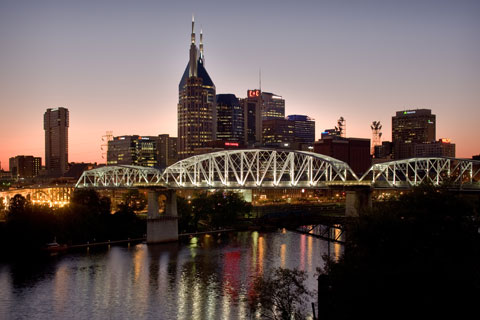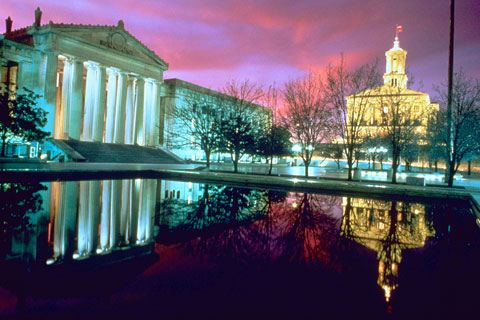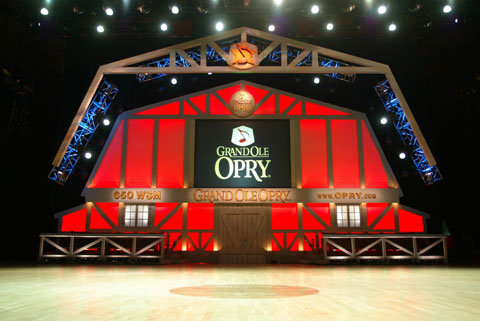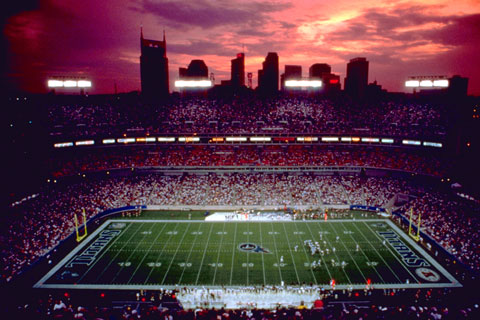About Nashville, Tennessee
Nashville, known as "Music City" or "Athens of the South" is the capital of the U.S. state of Tennessee and the county seat of Davidson County

Nashville is located on the Cumberland River in Davidson County, in the north-central part of the state. The city is a major hub for the health care, music, publishing, banking and transportation industries, and is home to a large number of colleges and universities.
Nashville has a consolidated city-county government which includes seven smaller municipalities in a two-tier system. The population of Nashville-Davidson County stood at 626,144 as of 2008, according to United States Census Bureau estimates. This makes it the second most populous city in the state after Memphis. However, the 2009 population of the entire 13-county Nashville Metropolitan Statistical Area was 1,582,264, making it the largest metropolitan area in the state. The 2009 population of the Nashville-Davidson-Murfreesboro-Columbia combined statistical area was estimated at 1,666,566.
Nashville was founded by James Robertson, John Donelson, and a party of Wataugans in 1779, and was originally called Fort Nashborough, after the American Revolutionary War hero Francis Nash. Nashville quickly grew because of its prime location, accessibility as a river port, and its later status as a major railroad center. In 1806, Nashville was incorporated as a city and became the county seat of Davidson County, Tennessee. In 1843, the city was named the permanent capital of the state of Tennessee.
HISTORY
By 1860, when the first rumblings of secession began to be heard across the South, antebellum Nashville was a very prosperous city. The city's significance as a shipping port made it a desirable prize as a means of controlling important river and railroad transportation routes. In February 1862, Nashville became the first state capital to fall to Union troops. The Battle of Nashville (15-16 December 1864) was a significant Union victory and the perhaps most decisive tactical victory gained by either side in the war.
Though the Civil War left Nashville in dire economic straits, the city quickly rebounded.[citation needed] Within a few years, the city had reclaimed its important shipping and trading position and also developed a solid manufacturing base. The post-Civil War years of the late 19th century brought a newfound prosperity to Nashville. These healthy economic times left the city with a legacy of grand classical-style buildings, which can still be seen around the downtown area.
It was the advent of the Grand Ole Opry in 1925, combined with an already thriving publishing industry, that positioned it to become "Music City USA".[citation needed], and in the early 1960s the city was home to the main activity of the 1960s Civil Rights Movement. In 1963, Nashville consolidated its government with Davidson County and thus became the first major city in the United States to form a metropolitan government.[citation needed] Since the 1970s, the city has experienced tremendous growth, particularly during the economic boom of the 1990s under the leadership of Mayor (now-Tennessee Governor) Phil Bredesen, who made urban renewal a priority, and fostered the construction or renovation of several city landmarks, including the Country Music Hall of Fame, the Nashville Public Library downtown, the Bridgestone Arena, and LP Field.
The Bridgestone Arena (formerly Nashville Arena, Gaylord Entertainment Center, and Sommet Center) was built as both a large concert facility and as an enticement to lure either a National Basketball Association or National Hockey League (NHL) sports franchise.[citation needed] This was accomplished in 1997 when Nashville was awarded an NHL expansion team which was subsequently named the Nashville Predators. LP Field (formerly Adelphia Coliseum) was built after the National Football League's (NFL) Houston Oilers agreed to move to the city in 1995. The NFL debuted in Nashville in 1998 at Vanderbilt Stadium, and LP Field opened in the summer of 1999. The Oilers changed their name to the Tennessee Titans and saw a season culminate in the Music City Miracle and a close Super Bowl game.
Today the city along the Cumberland River is a crossroads of American culture, and one of the fastest-growing areas of the Upper South.

TOPOGRAPHY
Nashville lies on the Cumberland River in the northwestern portion of the Nashville Basin. Nashville's topography ranges from 385 feet (117 m) above sea level at the Cumberland River to 1,160 feet (350 m) above sea level at its highest point.
According to the United States Census Bureau, the city has a total area of 526.1 square miles (1,363 km2), of which, 502.3 square miles (1,301 km2) of it is land and 23.9 square miles (62 km2) of it (4.53%) is water.
CLIMATE
Nashville has a humid subtropical climate, with short, generally mild winters, and hot and humid summers. In July, morning lows average around 70 °F (21 °C) and afternoon highs average 89 °F (32 °C). In January, morning lows average around 28 °F (−2 °C) and afternoon highs average 46 °F (8 °C). The coldest temperature ever recorded in Nashville was −17 °F (−27.2 °C), on January 21, 1985, and the highest was 107 °F (42 °C), on July 28, 1952.[9] In the winter months, snowfall does occur in Nashville but is usually not heavy. Average annual snowfall is about 10 inches (250 mm), falling mostly in January and February and occasionally March and December. The largest snow event since 2000 was on January 16, 2003, when Nashville received 7 inches (18 cm) of snow in a single storm; the largest on record was 17 inches (43 cm), received on March 17, 1892. Average annual rainfall is 48.1 inches (1,220 mm), typically with winter and spring being the wettest and autumn being the driest. Spring and fall are generally pleasantly warm but prone to severe thunderstorms, which occasionally bring tornadoes — with recent major events on April 16, 1998; April 7, 2006; February 5, 2008; April 10, 2009; and May 1–2, 2010. Relative humidity in Nashville averages 83% in the mornings and 60% in the afternoons, which is considered moderate for the Southeastern United States. In recent decades, due to urban development, Nashville has developed an urban heat island (UHI); especially on cool, clear nights, temperatures are up to 10 degrees warmer in the heart of the city than in rural outlying areas.
Nashville's long springs and autumns combined with a diverse array of trees and grasses can often make it uncomfortable for allergy sufferers. In 2008, Nashville was ranked as the 18th-worst spring allergy city in the U.S. by the Asthma and Allergy Foundation of America.
CITYSCAPE
The downtown area of Nashville features a diverse assortment of entertainment, dining, cultural and architectural attractions. The Broadway and 2nd Avenue areas feature entertainment venues, night clubs and an assortment of restaurants. North of Broadway lies Nashville's central business district, Legislative Plaza, Capitol Hill and the Tennessee Bicentennial Mall. Cultural and architectural attractions can be found throughout the city.
The downtown area of Nashville is easily accessible. Three major interstate highways (I-40, I-65 and I-24) converge near the core area of downtown, and many regional cities are within a day's driving distance.
Nashville's first skyscraper, the Life & Casualty Tower, was completed in 1957 and started the construction of high rises in downtown Nashville. After the construction of the AT&T Building in 1994, the downtown area saw little construction until the mid-2000s. Many new residential developments have been constructed or are planned for the various neighborhoods of downtown and midtown. A new high rise office building, The Pinnacle, was recently opened in 2010.
Many civic and infrastructure projects are either being planned, in progress, or recently completed. A new MTA bus hub was recently completed in downtown Nashville, as was the Music City Star pilot project. Several public parks have been constructed, such as the Public Square. Riverfront Park is scheduled to be extensively updated. The Music City Center, a convention center project, has been approved for the downtown area and is currently under construction.
PARKS & GARDENS
Metro Board of Parks and Recreation owns and manages 10,200 acres (4,120 ha) of land and 99 parks and greenways (comprising more than 3% of the total area of the county).
Warner Parks, situated on 2,684 acres (1,086 ha) of land, consist of a 5,000 square-foot (460 m²) learning center, 20 miles (30 km) of scenic roads, 12 miles (19 km) of hiking trails, and 10 miles (16 km) of horse trails. It is also the home of the annual Iroquois Steeplechase.
The U.S. Army Corps of Engineers maintains parks on Old Hickory Lake and Percy Priest Lake. These parks are used for multiple activities including fishing, water-skiing, sailing and boating. Percy Priest Lake is also home to the Vanderbilt Sailing Club.
Other notable parks in Nashville include Centennial Park, Shelby Park, and Radnor Lake State Natural Area.
METRO AREA
Nashville has the largest metropolitan area in the state of Tennessee, spanning several counties. The Nashville Metropolitan Statistical Area encompasses the Middle Tennessee counties of Cannon, Cheatham, Davidson, Dickson, Hickman, Macon, Robertson, Rutherford, Smith, Sumner, Trousdale, Williamson, and Wilson. The 2009 population of the Nashville-Davidson-Murfreesboro-Columbia combined statistical area was estimated at 1,666,566.
CULTURE
Much of the city's cultural life has revolved around its large university community. Particularly significant in this respect were two groups of critics and writers who were associated with Vanderbilt University in the early twentieth century: the Fugitives and the Agrarians.
Popular destinations include Fort Nashborough and Fort Negley, the former being a reconstruction of the original settlement, the latter being a semi-restored Civil War battle fort; the Tennessee State Museum; and The Parthenon, a full-scale replica of the original Parthenon in Athens. The Tennessee State Capitol is one of the oldest working state capitol buildings in the nation, while The Hermitage is one of the older presidential homes open to the public.
ENTERTAINMENT & PERFORMING ARTS
Nashville has a vibrant music and entertainment scene spanning a variety of genres. The Tennessee Performing Arts Center is the major performing arts center of the city. It is the home of the Tennessee Repertory Theatre, the Nashville Opera, and Nashville Ballet. In September 2006, the Schermerhorn Symphony Center opened as the home of the Nashville Symphony Orchestra.
As the city's name itself is a metonym for the country music industry, many popular tourist sites involve country music, including the Country Music Hall of Fame and Museum, Belcourt Theatre, and Ryman Auditorium. Ryman was home to the Grand Ole Opry until 1974 when the show moved to the Grand Ole Opry House nine miles (14 km) east of downtown. The Opry plays there several times a week, except for an annual winter run at the Ryman.
Numerous music clubs and honky tonk bars can be found in downtown Nashville, especially the area encompassing Lower Broadway, Second Avenue, and Printer's Alley, which is often referred to as "the District".
Each year, the CMA Music Festival (formerly known as Fan Fair) brings thousands of country fans to the city.
Nashville was once home of television shows like Hee Haw and Pop! Goes the Country, and to the Opryland USA theme park, which operated from 1972 to 1997 before being closed by its owners Gaylord Entertainment, and soon after demolished to make room for the Opry Mills mega-shopping mall.
The Christian pop and rock music industry is based along Nashville's Music Row, with a great influence in neighboring Williamson County. The Christian record companies include EMI Christian Music Group, Provident Label Group and Word Records.
Kirk Whalum visiting the audience at a riverfront concert in 2007Although Nashville was never known as a jazz town, it did have many great jazz bands including The Nashville Jazz Machine led by Dave Converse and its current version, the Nashville Jazz Orchestra, led by Jim Williamson, as well as The Establishment, led by Billy Adair. The Francis Craig Orchestra entertained Nashvillians from 1929 to 1945 from the Oak Bar and Grille Room in the Hermitage Hotel. Craig's orchestra was also the first to broadcast over local radio station WSM-AM and enjoyed phenomenal success with a 12-year show on the NBC Radio Network. In the late 1930s, he introduced a newcomer, Dinah Shore, a local graduate of Hume Fogg High School and Vanderbilt University.
Radio station WMOT-FM in nearby Murfreesboro has aided significantly in the recent revival of the city's jazz scene, as has the non-profit Nashville Jazz Workshop, which holds concerts and classes in a renovated building in the north Nashville neighborhood of Germantown. Fisk University also maintains a jazz station.

TOURISM
Civil War history is important to the city's tourism industry. Sites pertaining to the Battle of Nashville and the nearby Battle of Franklin and Battle of Stones River can be seen, along with several well-preserved antebellum plantation houses such as Belle Meade Plantation, Carnton plantation in Franklin, and Belmont Mansion.
Nashville has several arts centers and museums, including the Frist Center for the Visual Arts, Cheekwood Botanical Garden and Museum of Art, the Tennessee State Museum, Fisk University's Van Vechten and Aaron Douglas Galleries, Vanderbilt University's Fine Art Gallery and Sarratt Gallery, and the Parthenon. The Nashville Zoo is one of the city's newer attractions.
SPORTS
LP Field Nashville has several professional sports teams, most notably the Nashville Predators of the National Hockey League and the Tennessee Titans of the National Football League. Several other pro sports teams also call Nashville home, as does the NCAA college football Music City Bowl. The Vanderbilt Commodores are members of the Southeastern Conference. The football team of Tennessee State University plays its home games at LP Field.

ECONOMY
As the "home of country music", Nashville has become a major music recording and production center. All of the Big Four record labels, as well as numerous independent labels, have offices in Nashville, mostly in the Music Row area. Since the 1960s, Nashville has been the second biggest music production center (after New York) in the U.S.[25] As of 2006, Nashville's music industry is estimated to have a total economic impact of $6.4 billion per year and to contribute 19,000 jobs to the Nashville area.
Although Nashville is renowned as a music recording center and tourist destination, its largest industry is actually health care. Nashville is home to more than 250 health care companies, including Hospital Corporation of America, the largest private operator of hospitals in the world. As of 2006, it is estimated that the health care industry contributes $18.3 billion per year and 94,000 jobs to the Nashville-area economy. The automotive industry is also becoming increasingly important for the entire Middle Tennessee region. Nissan North America moved its corporate headquarters in 2006 from Gardena, California (Los Angeles County) to Franklin. Nissan also has its largest North American manufacturing plant in Smyrna, Tennessee. Largely as a result of the increased development of Nissan and other Japanese economic interests in the region, Japan moved its New Orleans Consulate-general to Nashville's Palmer Plaza.
Other major industries in Nashville include insurance, finance, and publishing. The city hosts headquarters operations for several Protestant denominations, including the United Methodist Church, Southern Baptist Convention, National Baptist Convention, USA, and the National Association of Free Will Baptists.
Fortune 500 companies within Nashville include Dell, HCA Inc. (formerly, Hospital Corporation of America) and Dollar General Corporation (in Goodlettsville).
Courtesy of Wikipedia.

